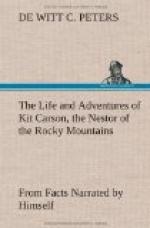a prayer to the Almighty in thanks for our deliverance
thus far. The pace now became tremendous; and
here our grain-fed horses proved to be too much (and
their powers of endurance were fully put to the test),
for the grass-fed ponies of the Indians. After
a short run, the savages saw that the advantage belonged
to us, consequently soon after they halted. We,
however, kept steadily, but with slackened speed,
on our course, fearing that some accident might change
the happy turn of affairs in their favor. On finding
themselves thwarted in their designs, the Indians
fired two or three shots at us, but even these final
compliments did not, to use nautical phraseology,
make us “heave to.” We reached the
settlement of the Red River in good season, and concluded
that we had traveled the distance in about as brief
a space of time as it ever had been accomplished either
before or since our adventure. Our horses were
so used up by this race that we were obliged to exchange
them for fresh ones, on which we finished our journey
without further annoyance. The Indians, in this
incursion stole five thousand sheep, besides other
property from the Costillo, and killed two men who
were traveling behind us and on the same road.
When the bodies of these men were discovered, one of
them had a mouthful of bullets, which he had evidently
put there in order that he might drop them into his
rifle as he should require them, and not be obliged
to be delayed in taking them from his ammunition pouch;
but, evidently, before he could have used more than
one from this supply, he was shot dead.
It cannot be denied but that this outbreak on the
part of the Indians, and its subsequent outrages,
was the result of mismanagement; and, it is but justice
to the reputation of Kit Carson to assert, that it
was no fault of his that affairs had terminated so
disastrously. He had used every means which human
skill could devise to allay the anger of the Indians.
Had his superiors in power acted with the same discretion
and judgment, in all probability the Utahs might have
been kept at peace. It is wonderfully strange
that our Government will persist in placing at the
head of Indian affairs men who are not practically
acquainted with Indian habits, which can only be learned
by a long life passed upon the frontiers. If
it was a matter where dollars and cents alone were
to be estimated, it might be different; but where
valuable lives are legitimately exposed, it seems to
us morally wrong to give the control of tribes of
wild men to politicians, who are liable to make all
kinds of mistakes, and in whom the Indians will not
repose the least confidence. It is because such
appointments are made that, in a great measure, the
troubles with these border Indians arise; and many
is the section of country in western America, where
apparently the reward for taking a white man’s
scalp is a blazing red or a sky blue blanket, which
is paid under the plea of keeping the peace.
This, too, when efficient means and decided measures
are the only hopes of a lasting peace.




